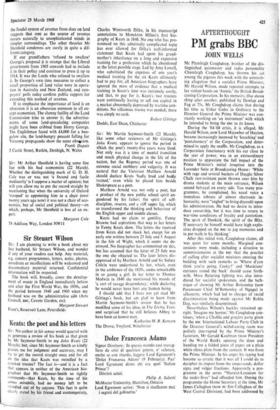Keats: the poet and his letters Sir: No author in
his senses would quarrel with as generous a review of his book as that given by Mr Seymour-Smith to my John Keats (22 March); but, since Mr Seymour-Smith so kindly praises me for judgment and accuracy, may I try to get the record straight once and for all on the idea that Keats was swindled by a crooked trustee? The fact is—and it is a fact that appears in neither of the American bio- graphies that Mr Seymour-Smith so rightly commends--that Keats, by the time of his annus mirabilis, had no money left to be swindled out of by anyone. This fact is quite Clearly stated by his friend and contemporary, Charles Wentworth Dilke, in his manuscript annotations to Monckton Milnes's first bio- graphy of Keats in 1848. No one who has pro- nounced on this admittedly complicated topic has ever allowed for DiIke's well-informed statement that Keats had spent his grand- mother's inheritance on a long and expensive training for a profession which he abandoned at the latest possible stage. Led by Amy Lowell, who substituted the expenses of one year's medical training for the six Keats ultimately had to pay for, all American biographers have ignored the mass of evidence that a medical training in Keats's time was extremely costly, and that, to pay for it, Keats's two trustees were continually having to sell out capital in a market abnormally depressed by wartime con- ditions. No villainous trustee was needed; there was simply no cash.






































 Previous page
Previous page